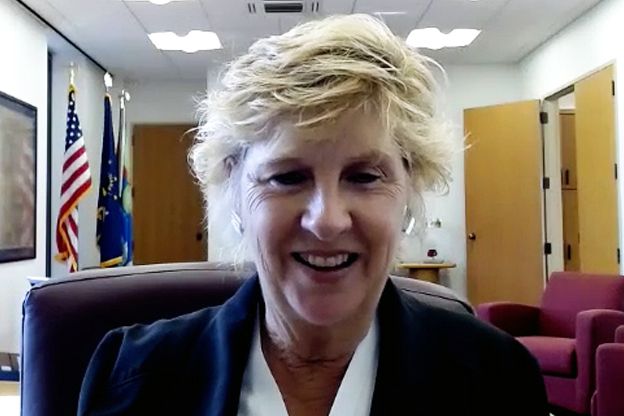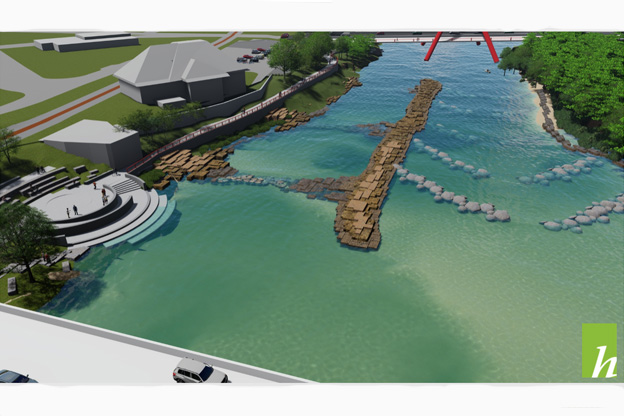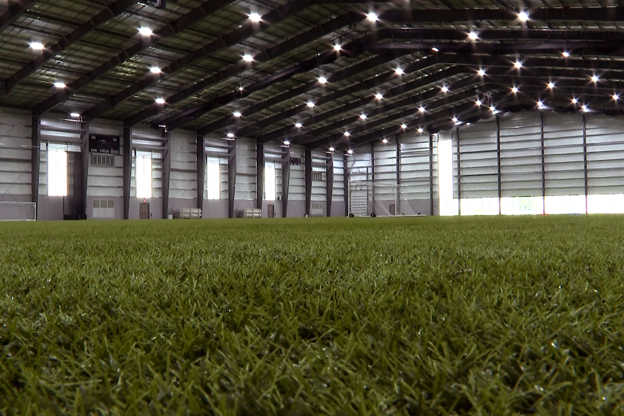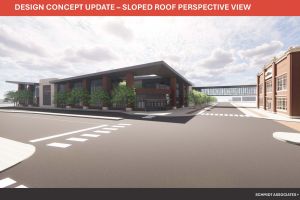Joe, hello and welcome to ask the mayor on wfiu. I'm Joe Hren. This week, we're in Columbus with Mayor Mary Ferdon. Hello and welcome. How wet Is it still there after Hurricane Helene? Not
Speaker 2
very obviously, it was dry enough that it absorbed the three to four inches that we got. So thankfully, we needed the rain, but our hearts go out to the people in the southeast who just seen such amazing devastation. Yeah, and
Speaker 1
I, What surprises me is you start seeing some of the flooding, and you think it's it's in Florida, and you see it's in Tennessee or Utah or someplace too that this flooding is going on everywhere, right?
Speaker 2
It seemed to be a convergence of weather events where, I think Tennessee and North Carolina and parts of Kentucky had had quite a bit of rain even before the hurricane came through. But, yeah, it does beg the issue, right? I mean, you think that you don't live on a coast, so you don't get, you don't get hurricane effects, but obviously you do. And unfortunately, this was a big one, so
Speaker 1
Well, thanks for joining us for the month of October. It's already October. I know in the past, we talked a lot about ongoing studies, housing, transportation. I think there was a salary study, and I think you're starting to get data from some of those, in particular the housing study and needs the Housing Studies and needs assessment. So what did it find? Any surprises? Really
Speaker 2
no surprises. To be perfectly honest, we understood that we do need housing, and that we knew we need housing across the board. Obviously, we need low income and affordable housing, but we also need kind of middle income and workforce housing, and even some at the higher end, because it's a spectrum. Right as people move and they make a little bit more money and they want to move up and buy a house is a little bit larger as their family grows, they need housing too. So nothing new of that nature. I didn't realize that, you know, we needed as much housing as we did. They were estimating we needed about 300 units a year for the next couple number of years. So, but that's great. We have good data now. We have good demographic data, and so now we're trying to kind of parse the different strategies and figure out what, what we want to prioritize. And then you know how we approach developers and and look at grant dollars, and you look at TIFF dollars. And so this just gives us great data. So we were thrilled to get at the company that did it, RDG. I believe, I believe they did some work in Bloomington and West Lafayette, so we felt like they did a very, really great job. And now we have data that we can move forward with. And it's not just, you know, kind of the anecdotal stuff that people like to talk about. It's real data that you can make decisions with. Yeah, we'll be pulling together a housing team in the near future. So
Speaker 1
So yeah, that the housing team is this a collaboration of many different areas in Columbus, right?
Speaker 2
We've had a number of different groups who've worked in different areas of housing, and so this is one where we've we've had a technical team that's worked with us on the study. And so now we'll kind of broaden that and work through Yeah, we definitely want developers and realtors and builders and finance people, right? Because it's the full spectrum. It's we are. It's great to have plans, but if the financial world doesn't support what developers need, then you've got to try different sources. And that's what we'll we intend to
Speaker 1
do. I see this was presented to the public. What was the public feedback been like from this?
Speaker 2
I think the public's feedback has been very positive. Again, I don't think we learned a whole lot. I mean, philosophically that we didn't know that we needed housing with the rest of the country, but it was helpful to understand the demographics and and help us prioritize. So, you know, my, my, you know my understanding is that the people that showed up were pleased with that. We actually had some results, and we can get moving forward.
Speaker 1
Do you have some budget allocations in this year's or, I guess that'd be for next year's budget to work with housing.
Speaker 2
We've got some ARP dollars left that we'll be using, and then we'll, we'll, we, I know that the redevelopment has allocated some housing for a couple of projects that are going after some tax credits. So I think what we will be doing is kind of putting together an overview of what we have been allocating in the past couple years on what what we're comfortable going to do going forward, and then ask for the community, you know that they can help prioritize how much funding we can put into housing.
Speaker 1
And obviously, we're in an election year. We won't know until at least November who will be in office next year on the federal level. So what would you like to see in a federal bill to help cities such as Columbus in housing?
Speaker 2
I think, more than anything, it's just kind of the understanding from both the state and the federal level that it's, you know, obviously Columbus is short as well as the entire country, and so, you know, what can we do to to make a difference. Obviously the interest rates going down, which the federal government has nothing to do with, but the interest rates going down will be very, very helpful. But I also get concerned, because I know with the hurricane that we just discussed going through the southeast, you know that that takes a big draw on construction materials, as you know, so many homes and businesses and buildings have to be rebuilt. So I think we'll anticipate construction costs and materials going up over the next couple of years. That can be related directly to that. So it's always a push and a pull, right? And so I think just understanding that whatever we can do to remove barriers that help us find people housing would be helpful.
Speaker 1
So speaking of budget, where is that process now with the city for next year?
Speaker 2
Great, Great timing, Joe, city council meeting will present our first budget reading, and so we've spent a lot of time with City Council this year, with having two new members, educating and making sure that city council had a say early on in the budget process. And they they've done a great job helping us understand what's important to them. And so the first reading of the budget is tonight, and I'm anticipating it'll go pretty well.
Speaker 1
You know, I do believe salary studies and adjustments, especially for first responders, are underway, but this is happening in Terre Haute in Bloomington. How hard is it to play catch up?
Speaker 2
It really is. Now we actually made our big catch up back in 2024, we gave a 16% increase to police, and 14, I think 14 and a half to fire. And so this year, we're back on course with a recommended 4% increase. But that doesn't mean that, you know, next year it might be higher again, because we're all trying to recruit from the same pool, and unfortunately, communities are passing employees back and forth as employees see that, you know, one community pays a little bit better or has better benefits, so it is very, very difficult to keep up with that. And of course, we're all following what the State Police pays, but we, fortunately, we have a great city council who understands the value of being able to recruit really good people and retain the ones that we have. It's so expensive to lose employees just the training costs alone are very, very high.
Speaker 1
So a month ago, we were talking about, well actually, I didn't get to this question about annexation, so I thought I'd save it for this month. And I don't know if we can how much we can talk about it today, but I do understand the Columbus plan commission voted unanimously. I think it's a little while back to forward a favorable recommendation to city council. I believe it's an annexation about 100 acres in Columbus to be used, of course, for future development. Where is that and where is that, right now,
Speaker 2
right? So that'll go to city council in October for a vote. They've, they've all been updated with it, and so they've had the opportunity to talk with the petitioners, as well as the the property owners who who aren't supportive of the annexation. So it's, it's kind of up in the air, to be honest, it's city council members understand that our need to grow, and unfortunately, the best way to do that is through annexation, but it's an involuntary annexation, and those don't happen very easily, so stay tuned for that one. Yeah, we,
Speaker 1
we know a lot about non voluntary annexation. Here in Bloomington, we've been going through that for eight years, I think. But now, is that land developed, or is it undeveloped?
Unknown Speaker
It's undeveloped at this point in time. Okay,
Speaker 1
yeah, okay, so is there? I mean, is this a way of of Columbus saying we want to grow out or or density also part of this, right?
Speaker 2
It's a little bit of both, right? So typically, what we're realizing is it's from a housing perspective, we have to go more dense if we if we want to be able to provide the number of units that we need to provide. That being said, though that many people still want the single family home, and so we just don't have property within the current city limits to provide those so if we want to provide more single family homes, we have to physically annex more property in order to do that. However, going back to the housing study we were talking about, density is something that typically a. Lot of Americans prefer to have single family homes. They want their own yard. They want to, you know, they want to drive away where they can have two or three vehicles. But that's not always the most efficient way to provide housing. As well as a lot of people just entering the market, it's much more affordable if they can buy a condominium or rent an apartment for a while and so. So density is really something that planners push very heavily, is that the understanding that oftentimes, in order to provide the kind of housing that you need, you have to be you have to go up, you can't always go out. So there's, again, there's work on both sides for that. But in our case, if we want to grow more single family homes, we really do have to annex out. And
Speaker 1
does the city have its own water and sewer service?
Speaker 2
The city owns the Columbus city utilities. They're they're operated a little bit independent. They have an independent board, but yes, they're still owned and controlled by the City of Columbus.
Speaker 1
And does the city allow the water sewer to go to non annexed areas, like county residents on the border,
Speaker 2
we typically do yes in different agreements, we've allowed water and sewer hookups to non city residents and businesses,
Speaker 1
and then I assume you're talking about the petitioners waivers. You might have a waiver to those users that they can't protest annexation if they receive the water and sewer. I don't know
Speaker 2
that we've had that waiver. It may have existed in the past. I'm currently not aware of that. Okay,
Speaker 1
well, interesting, something we'd love to keep an eye on,
Unknown Speaker
probably in November. Yeah,
Speaker 1
yeah, we'll, we'll follow up with it. Then, you know, I was met with Terre Haute Mayor Brennan sackbun on the Wabash River a month or so ago. We talked about how a river is can be an amenity and so much more to a city. And I compared it to Columbus and and how Columbus is also working on that. Do you have any updates on the river way project as well.
Speaker 2
Well. Coincidentally, this morning, we had a pre bid meeting for contractors to we're re releasing the bid for the riverfront this fall, hoping to get a more favorable bid amounts. It's it involves many, many different pieces. So again, in November, we should have a good feel on the on where that's going. Unfortunately, that's been hit, obviously, by continually construction increase, increases in cost over the past seven years. It took us, and I think we've talked about this, and I'm sure you did with the forum here, it took us, I don't know, five or six years just to get all the permitting done that we needed through the state of Indiana, and the Army Corps of Engineers, which is, you know, extremely frustrating for any community, because we could have had the, we believe we could have had all the improvements that we needed for safety as well as entertainment amenities done years ago. And so it's just really almost doubled the cost. But we are continuing to move forward. And like I said, we had a pre bid meeting to talk with contractors, and we've got a lot of interest in it. So, you know, the goal is to get that moving along. Yeah,
Speaker 1
there's so many parts to that. Because there's the environmental part, there's also, isn't there a low level dam part too, that needs to be taken out or replaced?
Speaker 2
Yeah, there's a dam that needs to be removed. It's a danger that I think it's I one of the regulatory organizations. It's either idem or DNR really wants it to remove those low head dams, because they're such a big danger. But it butts up against when you remove a dam, sometimes it can change the flow of the water, and so what you have to put back in to replace and flow of the water for the fish. So there's many different regulatory agencies weighing in on what they believe is the best way to change the river, which has caused a lot of our delay. So just a couple
Speaker 1
weeks ago, I believe I saw a report from locally there, from the Republic, about the sports complex Nexus Park being behind projections. So how much funding is Nexus Park falling behind? And where is it now? And how do you feel about it moving forward?
Speaker 2
So yes, when we made projections for 2024 for the 2024 budget season, which was last July, right? So it's probably about 15 months ago, we were still basing it on hope, being hopes, hoping to be open January 1, which we were not we had some construction delays, so we didn't really open until April. So that really affected our revenue for this year. But since that actual report that was in the Republic, I think we've added 80, $90,000 worth of revenue this year already, just in September, and we've got tournaments booked solid from mid October through mid April, so our our numbers are picking up. We've We've got wrestling match. We've got a huge wrestling match this coming weekend, and then we've got a big softball match right across the street. So I'm not quite sure how we're going to handle all the athletes in town, but we've got Jim, Jim NASS. Six, wrestling, Cheer, cheer, basketball, baseball, fastest fast pitch, baseball, fastest pitch. Softball, volleyball, pickleball, you name it. So we're really excited, and I we believe that by by the end of 2025 we'll be on the track that we wanted to we had also, we were getting help from a contractual company to help us learn how to schedule, and we're backing off on that contract. So 2025, should look much better than it might have six months ago. Just by
Speaker 1
chance, do you have a number? I mean, is there a number that you need, like from city council to reappropriate funds, or are Are you okay,
Speaker 2
yeah, no, we're good. We we know that this feels will take a subsidy from the city, from the general fund for a couple of years. That was just a given. And so again, we hope to not have to use all of that subsidy. And 2025 but you know, we're still full steam ahead. And like I said, we've been able to book that book, The Field House, to a level that we had anticipated. We also have started talking to some concert promoters about concert series. We had a hospice concert September Labor Day weekend that went really well, and so they've rebooked for next year. And so we're hoping that we're able to bring in other concerts, which we kind of thought about a little bit when we were building it, but didn't realize just how well it works. Because people can bring in chairs so you can you can cram quite a few people in there. You can client. It's climate controlled. We've got two thirds turf, 1/3 turf or 1/3 hardcore, so you can bring in food. So it's really worked out well for that particular concert. So all what I'm saying to you is, yes, unfortunately, we were behind, and we will be a little bit behind this year on revenue, but we hope to make that up by next year. And
Speaker 1
do you just have last quick question? Do you have just a number that people can wrap their minds around about how much it's behind?
Speaker 2
You know, I don't, and I apologize, I like I said, there was a number in the story used, but we've since made some of that up, right,
Speaker 1
right? Right? We, if anything that would be outdated by now, right?
Speaker 2
We did schedule a subsidy for 24 we reduced that subsidy in 2025 and hope to not have to use all of it, or even some of it. So
Speaker 1
hey, and I hear Mother Bears pizza has announced that it's, it's finally going to open indexes part, right,
Speaker 2
right. It did actually open last week. Oh, did it? Yeah, they opened last a week ago Monday, very generously, had a soft opening for three nights, and gave half of the proceeds back to some local charities, which was great. And I just actually talked with the owner yesterday, and he said I asked how it was going, and he said, Well, it's going too well. We're just overwhelmed with the number of people. And so he's, I think he's pleased with the result, but I think a little surprised about how busy it's been.
Speaker 1
Oh, that's good, and that's good. How about other retail space there in in that areas, are they being filled? Or still, still, a little rough. No, they
Speaker 2
are being filled. We added a new tea place. We have a new health health food store and deli coming in. We have a nails place that opened recently. We've got sporting places that are opening up. So yeah, we're beginning to fill
Speaker 1
great I was like to leave the last minute to you. Is there any other announcements, things that maybe I missed, things coming up on City Council we need to know about.
Speaker 2
Well, the fun stuff. How about so we're celebrating our 40th ethnic Expo, not this weekend, but the following weekend, October, 11 and 12th. This is our 40th year. So we don't have a host country where the host, the countries that we're highlighting are as all the countries, and so it should be. It's great. Every year we have 20, 30,000 people over two days, and so we're hoping again for a good turnout this year. I haven't looked at the weather forecast. I know that the staff, you know, looks at it hourly for the next week or so, but it's always a great time. So yeah, anybody in Bloomington or the region who wants to come over and just enjoy great food, wonderful music, and just a chance to celebrate fall we'd love to have them.
Unknown Speaker
Is that behind city hall? Yeah, I'm
Speaker 2
sorry, yes, it's behind city hall on First Street and lots of parking in the area. So it opens 11 o'clock on Friday, on the 11th runs till, I think 10, and the next day it opens at 11 and runs till 10 or 11. So
Unknown Speaker
great fun times is the Fall is here?
Unknown Speaker
Something great every weekend, exactly, exactly.
Speaker 1
Hey. Thank you so much for coming on the show. Appreciate learning more about Columbus, and hope to see you next month. Thanks.
Unknown Speaker
Joe, happy, October,
Unknown Speaker
thank you. Bye.














